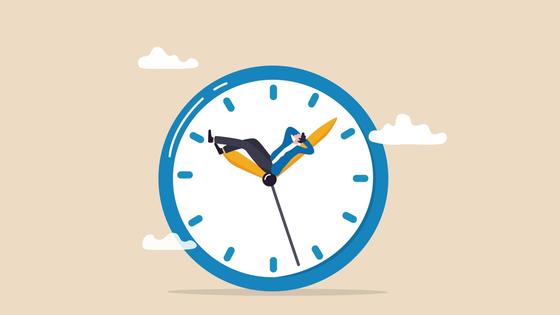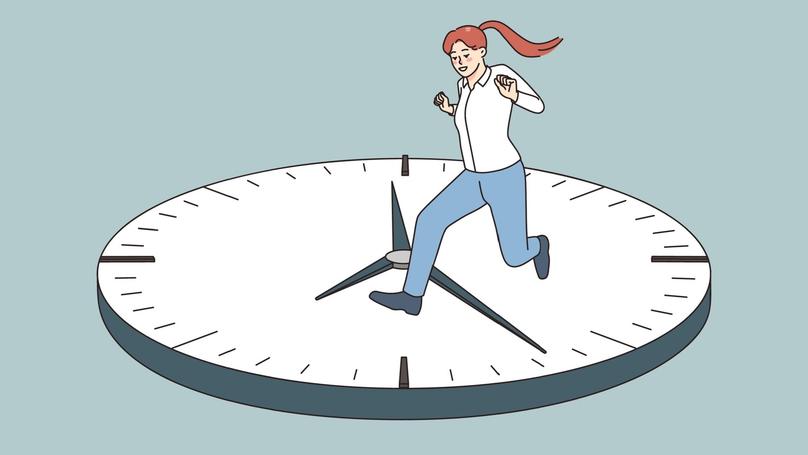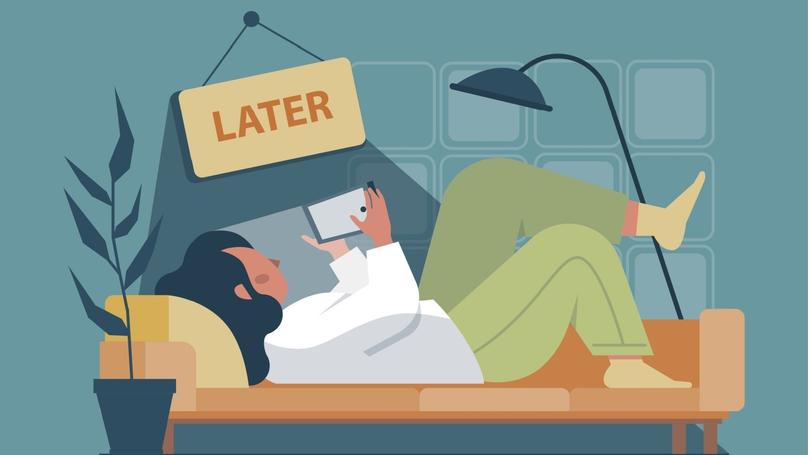There Is No Time Like the Present! Delayed Life Syndrome and How To Cope With It
“I'll update my wardrobe once I lose weight!”, “I'll pay off the mortgage and then go on holiday”, “Once the kids go to university school, I'll finally start taking care of myself.” Do these statements sound familiar? If you too tend to think “Once …, I’ll finally do something”, then you are most likely experiencing delayed life syndrome. What is it, how does it come about, and can you get rid of it? The answers are in this article.

What is delayed life syndrome?
Delayed life syndrome is a set of attitudes, beliefs, and values that are characterised by waiting for better times, preparing for them, and refusing to satisfy needs and desires in the present. Simply put, a person with this syndrome is sure that their life has not yet begun, they are only preparing for it, creating the right conditions. One can say that they perceive the current life as a draft of the future one, which will start later and will be much better. This "later" will come after some significant event, for example, moving, getting married or divorced, repaying a loan, graduating from university and so on. Such an attitude prevents a person from living in the present moment; they are convinced that they can become happy only after having completed this experience. But in fact there is no correlation between these things, and one can live a happy, full and meaningful life right now!
At the same time, delayed life syndrome manifests itself in different ways for everyone. For example, you have long wanted to go to an expensive restaurant, but you can't find a good reason for it. Or maybe you have long bought an expensive dress for a special occasion, but it will not come. Equally, many single people have the delayed life syndrome manifested in their confidence that life will brighten up with new colours, interesting hobbies, pastimes, and the opportunity to travel only after they meet the person they love.
Of course, delayed life syndrome is not a new concept and is very common among people all over the world. Rudyard Kipling described this phenomenon two centuries ago. He spoke about the so-called "colonial scenarios", which were inherent in the British who lived in colonial India for many years. Most of them sincerely believed that "real life" would begin only when they returned to England, where they would have their own little house in the provinces and walk their dog in the beautiful countryside.
How does this syndrome occur, and who is vulnerable to it?

Delayed life syndrome affects both men and women equally. Most people who experience this syndrome have developed it in childhood. Therefore, the key reason for its occurrence is upbringing and family attitudes. Parents often say, "Once the holidays come, you will watch cartoons late into the night", "Finish school, then do what you want", "When you go to university, you will make your own decisions", and so on. Thus, children are programmed from a young age to postpone something significant and important for them for the future. The child accepts this attitude, and with each such phrase they are subconsciously convinced that positive emotions and satisfaction can be received sometime later or for special merits.
In addition, delayed life syndrome appears as a result of low self-esteem and insecurities. A person may think that they are simply not good enough for the life of their dreams. They believe that it is necessary to become an ideal, to gain more experience, to get better in different spheres, then they can start life "from scratch".
Another personality trait that contributes to delayed life syndrome is perfectionism and fear of making mistakes. In this case, the person fears that they might fail. Therefore, they choose to do nothing and put things off until later. An important cause of the syndrome also lies in procrastination, the inability to plan your time and prioritise. Sometimes we feel that studying or working prevents us from living the life we want to live. But the reason for this is only the misallocation of our resources, as well as lack of control over ourselves and our time.
However, there are also external, socio-economic reasons. For example, society's exaggerated expectations, the cult of success and achievement provoke the development of delayed life syndrome. Many people believe that it is normal to work your fingers to the bone to be approved by society. "When I pay off the mortgage, then I will really enjoy my life" - this is about the imposed ideas of an idyllic life.
Signs of delayed life syndrome: a checklist from Lectera

As we have already learnt, delayed life syndrome can be common to everyone. If you too are constantly lacking something to be happy, we suggest you go through a special checklist from Lectera and see if you are affected by delayed life syndrome. Tick the box if you can relate to it:
-
I am constantly anticipating events in the future, for example, looking forward to bank holidays or weekends, taking a holiday, getting married, closing a mortgage, passing exams, and so on.
-
I tend to hoard things - I like to buy new table sets, clothes and accessories, but I always save them "until better times".
-
I often put my plans on hold and hesitate to act in the moment.
-
I am always comparing myself to others, criticising, downplaying my own merits, yet I don't try to change anything in my life.
-
It takes me a long time to make a decision and then I question it.
-
I can't get excited about the present and I see negativity everywhere.
-
I believe that everything depends on external circumstances, not just my actions.
Accordingly, the more boxes you check, the more likely it is that you too are affected by delayed life syndrome. Another way to be sure of this is to watch what you say and how you formulate your thoughts. People suffering from delayed life syndrome can be identified by typical phrases such as:
-
"Once we pay off the mortgage, we'll live in our own flat and everything will be fine";
-
"I'll finally be happy when I get the director's position";
-
"I won't date anyone until I lose weight";
-
"I've lost a couple of kilos, but I could have lost five";
-
"Five more years and we'll definitely move, but in the meantime we need to save up some money".
So, if you notice yourself saying such things, tend to postpone everything for later, put things away "until better times", save up "for a rainy day" and so on, you have become a victim of delayed life syndrome. Do not be worried, you can cope with it on your own.
How to stop putting life on hold

This short practical guide will help you realise how delayed life syndrome affects you and why it's important to get rid of it:
Step 1. Find out what delayed life syndrome is costing you
Figuring out what you have given up and what you have set aside for the future is important. Make a list of those things you haven't bought, things you haven't done, trips you haven't taken and other plans you've made, and list the problems and additional difficulties that your behaviour has caused. Be honest with yourself about whether you are willing to continue to make these sacrifices and deprive yourself of prospects and opportunities.
Step 2. Draw up a plan of action
You've already figured out what things you keep putting off and why. Now it's time to fix it. Make a detailed and precise plan on how to realise the missed opportunities and achieve your goal right now, instead of waiting for the right time. Start taking action, for example, talk to your boss about a promotion, wear that "special occasion" dress or suit to work, unpack the holiday set and use it every day, or go on a date even if you haven't lost weight like you promised yourself.
Step 3. Treat yourself
According to research, the more often you experience positive, vibrant emotions, the higher your level of life satisfaction. Make it part of your daily routine to do things that genuinely delight and amuse you. For example, try to visit exhibitions or concerts more often, meet your friends in your favourite café every weekend, and at least sometimes indulge in your favourite dessert, expensive shopping or just one extra weekend.
Step 4. Get rid of bad habits
In this case, we are talking about hoarding and the tendency to put things off until later, to procrastinate until the last minute. Try to realise your ideas in the moment, do not limit yourself. You can start with the simplest things to overcome your inner resistance.
But in case waiting for an important event in the future completely consumes you, prevents you from focusing on the present, distracts you and makes you idle, you should consult a psychologist. A competent specialist will tell you about mindfulness practices and help you get rid of negative attitudes and beliefs and look at the world more rationally and objectively.
Lectera’s Online Courses by topic
Best books to deal with delayed life syndrome
It can be difficult to understand the causes of such attitudes and cope with them on your own. Psychological literature can help you with this. For example:
- "NOW!" Seize the moment. It's all you've got" by personal growth coach Erik Bertrand Larssen. This book is a collection of valuable advice for those who are bogged down in routine and have stopped appreciating the present moment.
- "The Power of Now" by Eckhart Tolle is the real key to finding inner harmony and peace. The author talks about the power of the moment and shares advice on how to free your own mind from obsessive thoughts and yourself from endless fuss.
-
"Silence: The Power of Quiet in a World Full of Noise" by Thich Nhat Hanh is about the importance of appreciating the most important human resource, silence. Our minds are often filled with meaningless, intrusive musings and endless noise. In the pursuit of happiness, we do not notice that life is happiness. We need to feel it every day and be grateful for it. This book will help you to live mindfully, in harmony with yourself and the world around you.
-
"The Mountain Is You. Transforming Self-Sabotage Into Self-Mastery" by Brianna Wiest is another book about the importance of striving to achieve balance and peace and giving yourself a break from the endless pursuit of achievements and goals.
These books will help you practice mindfulness, live life in the moment and appreciate the present. This is exactly what happiness looks like! Trust that you deserve it right here and now. There is no reason to delay for tomorrow what you can achieve today!
Share this with your friends via:
Latest News

In the UK, £23 million has been allocated for the expansion of the EdTech Testbed program — pilots of educational technologies in schools and colleges.

In the US, Tuskegee University announced the launch of Tuskegee University Global Campus (TUGC) — a new online platform for distance learning.

A significant stage in the development of the alternative education system has begun in West Northamptonshire in the UK: the County Council is actively calling on parents, guardians, and trustees to participate in shaping the future of this key area.

Outwoods Primary School in Atherstone, Warwickshire, having experienced deep sadness after the loss of their famous cat, Silla, has found solace in a new pet – a Maine Coon named Aloysius O’Hara.

In modern universities, artificial intelligence, and in particular ChatGPT, is rapidly transforming from a controversial tool into a full-fledged student assistant.












 Spring skills audit: what to remove, strengthen, and “sow” in learning
Spring skills audit: what to remove, strengthen, and “sow” in learning
 9 Career Mistakes Young Professionals Make
9 Career Mistakes Young Professionals Make
 £23 million allocated for the expansion of EdTech Testbed in the UK
£23 million allocated for the expansion of EdTech Testbed in the UK
 Test: How Psychologically Mature Are You? Check Your Inner Foundation.
Test: How Psychologically Mature Are You? Check Your Inner Foundation.
 Test. Check Your Social Media Dependency Level!
Test. Check Your Social Media Dependency Level!
 Test: What Business is Right For You?
Test: What Business is Right For You?
